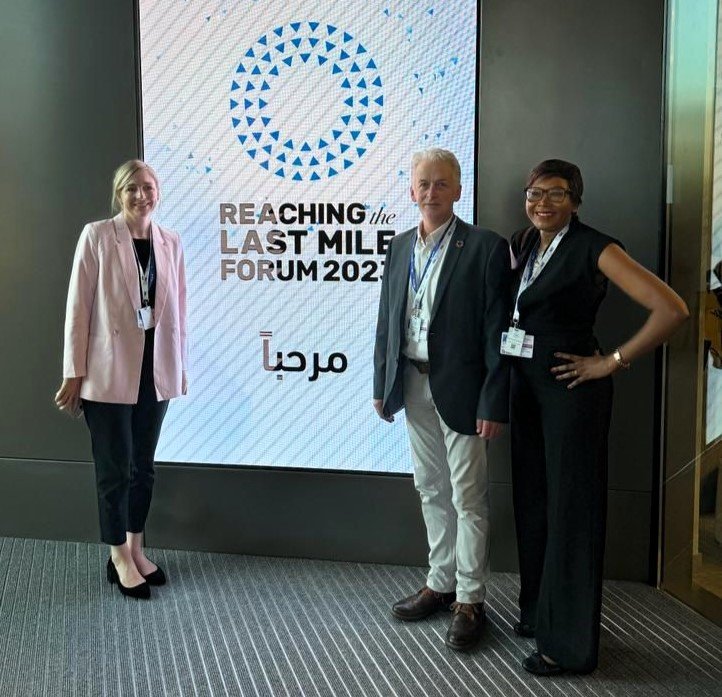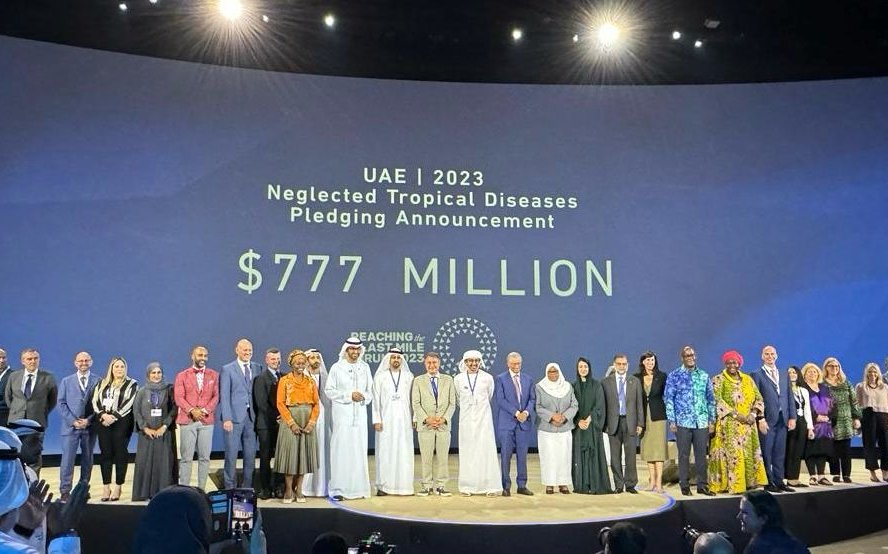On 3 December 2023 for the very first time at the Conference of the Parties to the Convention (COP), COP28 in Dubai, UAE held a dedicated Health Day to emphasise the link between health and climate change and recognise that the climate crisis is a health crisis.
To coincide with this, the 2023 Reaching the Last Mile Forum was held, an anchor event held under the patronage of His Highness Sheikh Mohamed bin Zayed Al Nahyan, President of the UAE, and in collaboration with the Bill & Melinda Gates Foundation. This was a brilliant, galvanising opportunity to spotlight neglected tropical diseases (NTDs) and their connection to climate change, featuring a dedicated moment to celebrate the remarkable progress made against NTDs and announce new commitments towards disease elimination goals, totalling a groundbreaking $777 million!
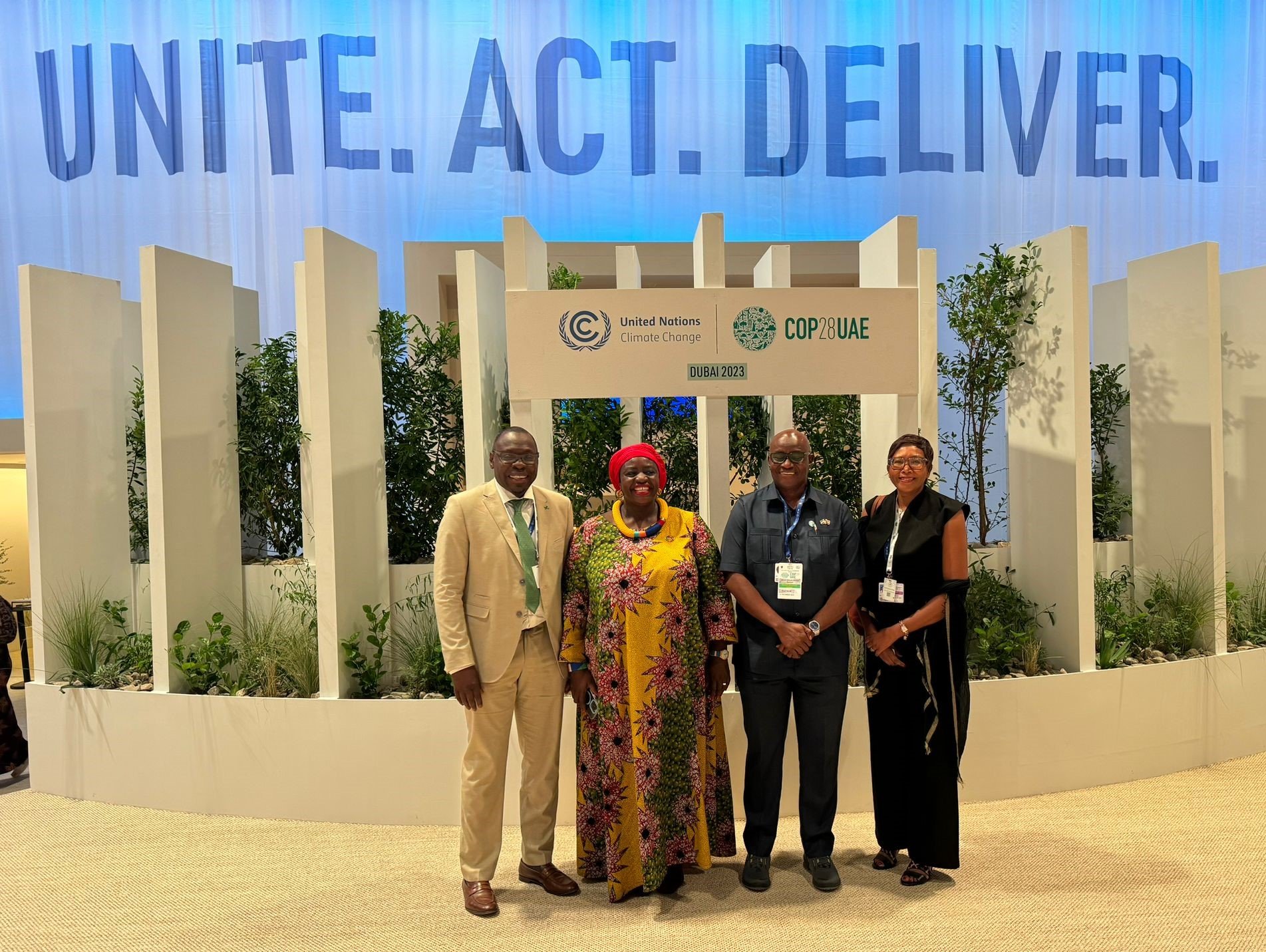
Uniting to Combat NTDs were delighted to attend and support partners showing their commitment to tackling NTDs. Here are some of our highlights from the Forum:
Morning – setting the scene on the link between climate change and NTDs
The morning saw a packed agenda of engaging discussions and setting the scene as to why tackling NTDs is so important when considering the changing climate.
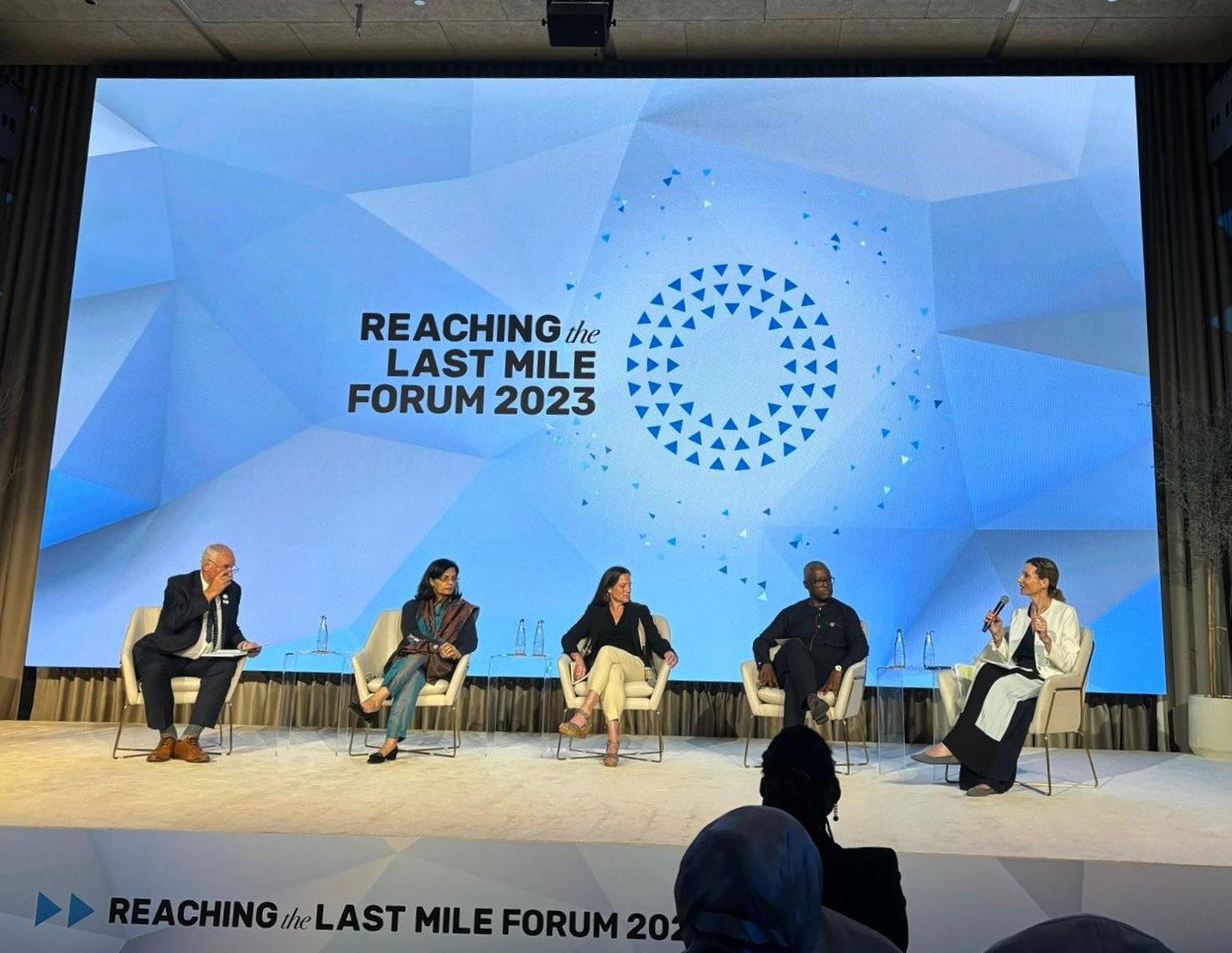
At Global Health in a Changing Climate, panellists explored the climate-health relationship, and which interventions should be prioritised to protect the communities most affected. Dr Basu of the Pandemic Fund at the World Bank stressed how climate change is exacerbating the risk of pandemics, with experts predicting a 50% chance of another COVID-like pandemic in next ~20 years, meaning we need to act fast.
Desta Lakew, Group Director of Partnership and External Affairs at AMREF Health Africa set the scene for Africa, saying:
“Africa has great potential but is seeing the significant impact of climate change. […] 56% of public health incidents are climate-related. We need to strengthen early warning and detection, strengthen health systems, and ensure health workers are trained and supported.”
At the Importance of Partnership on Climate and Health session, Elizabeth Yee, Executive Vice President of Programs at the Rockefeller Foundation said:
“We need not only more, but better-quality funding to accelerate climate and health solutions. Only half a percent of climate funding goes to projects in human health. That has to change if we want to ensure a planetary future for all of us in this room, and for all of our children and families that are counting on us.”
During the Breaking the Silos on Climate-Sensitive Diseases session, it was incredibly impactful to get the perspective of Senator Dr Nishtar from Pakistan who shared her country’s experience of climate change when Pakistan was hit by devastating floods in 2022. She said:
“The scale of the problem cannot be described in words. 33 million people were affected by the floods of 2022. We lost 10% of GDP, entire villages were wiped out, cattle was washed away, and our infrastructure decimated. There was a colossal increase in disease burden with a 900% increase in dengue and we lost 10% of health facilities. We must recognise the imperative to act.”
Panellists also offered solutions with Dr Adekunle Charles, CEO of RBM, saying:
“What can we do? Firstly, we need a multi-pronged multi-sector approach to strengthen health systems, break down the silos, create more integration and extensive partnerships. […] Second, we must invest – invest, invest, invest in health systems. We should also think about how we can optimise resources and continue to integrate. […] Thirdly, we need to be innovative across everything.”
Financing the Last Mile looked at how best to leverage financing to accelerate climate and health goals. Amit Bouri, CEO of Global Impact Investing Network said:
“If we are to mobilise large amounts of capital, we need to use tools like blended finance.”
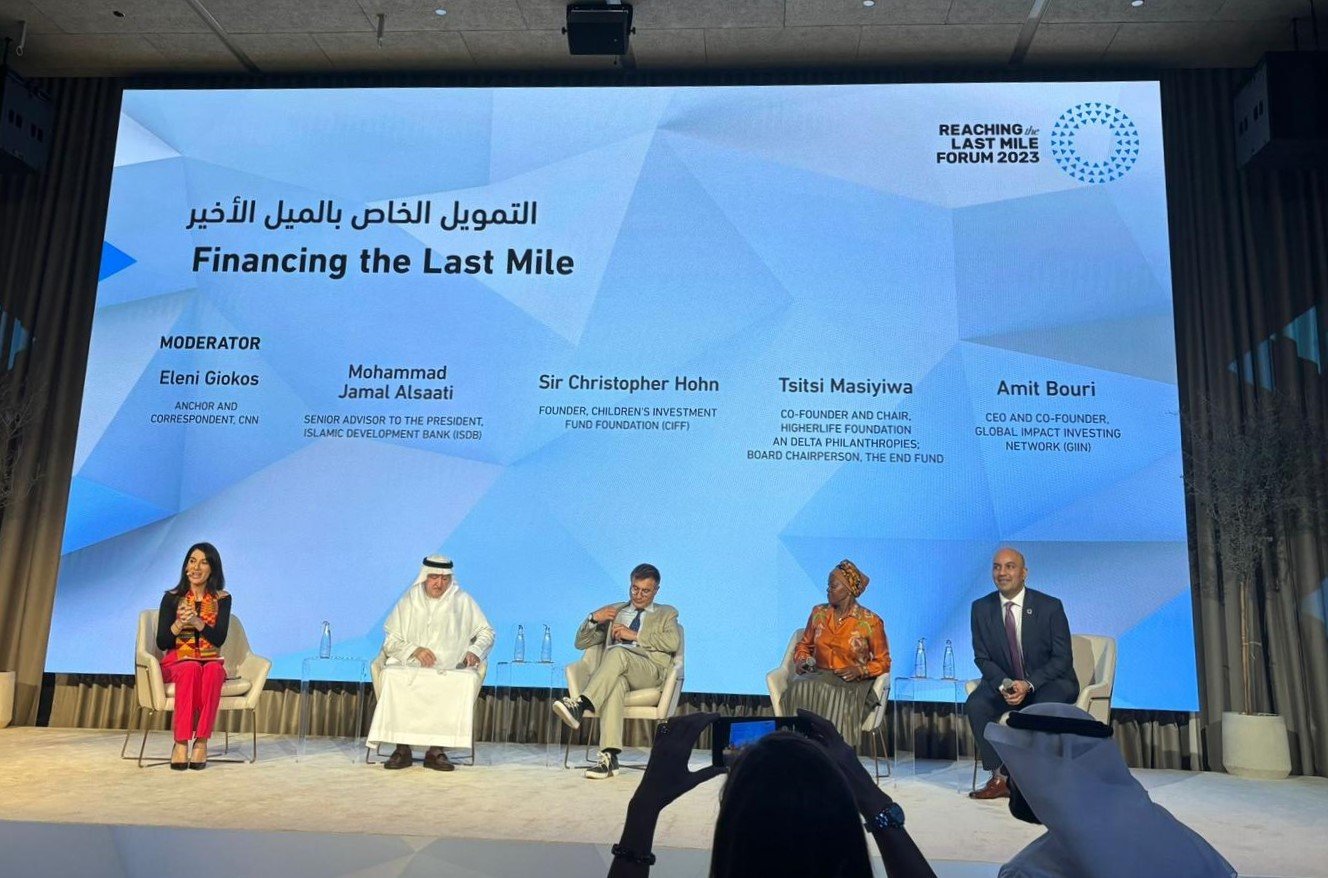
In summary, the morning plenary recognised that there has been tremendous progress in the disease elimination space with 50 countries having eliminated an NTD and more diseases closer to elimination than ever before. But climate change is putting that progress at risk, as seen through Pakistan’s experience of immense devastation due to climate change which saw a 900% increase in dengue. Major themes included the need to innovate, invest, and ensure we are reaching the last mile communities. It was also flagged that we need to recognise that investments in health are savings, not costs - for every $1 invested in health, there is a $4 return.
Afternoon – a moment of celebration and ground-breaking commitments to tackle NTDs
The afternoon opened to a moving experiential poem:
“Benevolent health keepers; Integrating, shaping the destiny and wellbeing of the world together.”
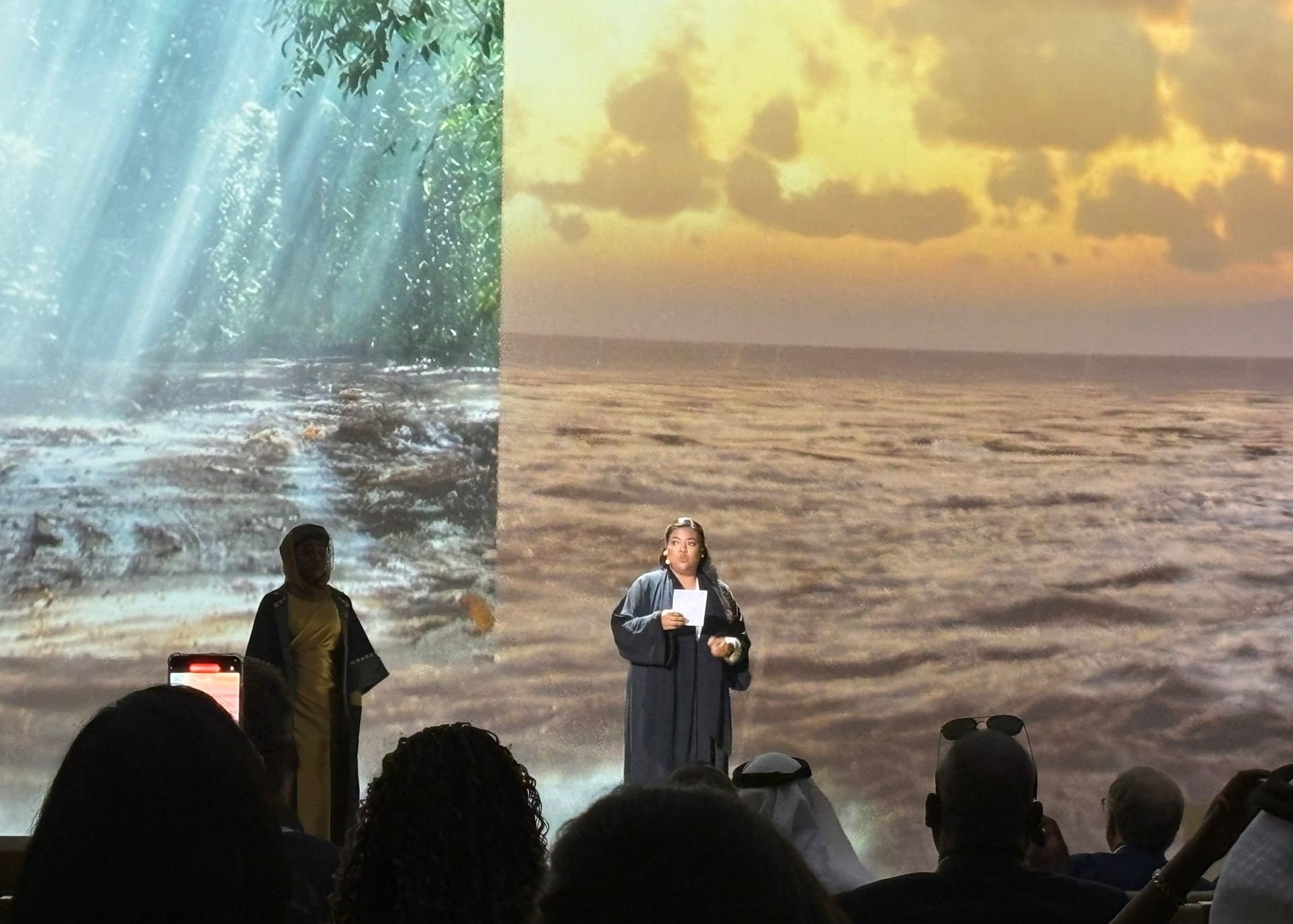
Then came the commitment moment where we were delighted to see pledge after pledge - both past investors standing strong and investing even more to benefit the 1.6 billion people affected by NTDs, and new countries and investors coming on board to show their commitment to tackle these preventable and treatable diseases.
His Highness Sheikh Abdullah bin Zayed Al Nahyan opened the proceedings, saying:
“Today’s demonstration of global solidarity reflects a shared determination to deliver a better and more dignified future for all. Incredible progress over the last two decades has proved that a world free of NTDs is an achievable goal. We warmly thank governments, donors, and partners for standing with us as we strive to achieve it.”
Reaching the Last Mile then joined with the Bill & Melinda Gates Foundation and partners Sierra Leone, Tanzania, the Carter Center, Sightsavers, the Children’s Investment Foundation Fund (CIFF), the Helmsley Charitable Trust, the END Fund, and Abu Dhabi National Insurance Company to announce a milestone expansion of the Reaching the Last Mile Fund from $100m to $500m. The expansion will increase the reach of the fund from seven countries to 39 across Africa and Yemen, with the goal of eliminating two NTDs, lymphatic filariasis and onchocerciasis (or river blindness), from the continent of Africa.
It was brilliant to see African Heads of States and their representatives up on stage and sharing their commitments. H.E. Julius Maada Bio, President of Sierra Leone, said:
“There is clarity of vision as well as growing demand and energy in Africa to see the continent free of NTDs. Political commitment has been sustained and energised through the Kigali Declaration, and through the Continental Framework and Common Africa Position on NTDs, which Sierra Leone is proud to have endorsed. That is why Sierra Leone is proud to pledge towards an Africa free of river blindness and lymphatic filariasis. Neglected tropical diseases cause suffering to millions, and we simply cannot afford to neglect them any longer.”
H.E. Samia Suluhu Hassan, President of Tanzania, said:
“I am immensely proud to have been at the centre of the launch of this ambitious vision of an Africa free of river blindness and lymphatic filariasis. Tanzania commits to increase domestic contribution for combating NTDs but also counts on continued support from development partners in this endeavour.
“While gaps in global funding for NTDs remain, this initiative signifies a crucial step forward in enhancing the health and quality of life not just for Tanzanians, but for all who live on the African continent. Together, we can end these terrible diseases, forging a path to a healthier and brighter future for us all.”
In addition, the wider pledging moment saw new, multimillion-dollar commitments made by organisations including the Anesvad Foundation, CIFF, Global Health EDCTP3, UBS Optimus Foundation, NALA Foundation, Evidence Action, Helen Keller Intl, and the Fred Hollows Foundation, in addition to the governments of Germany and Belgium.
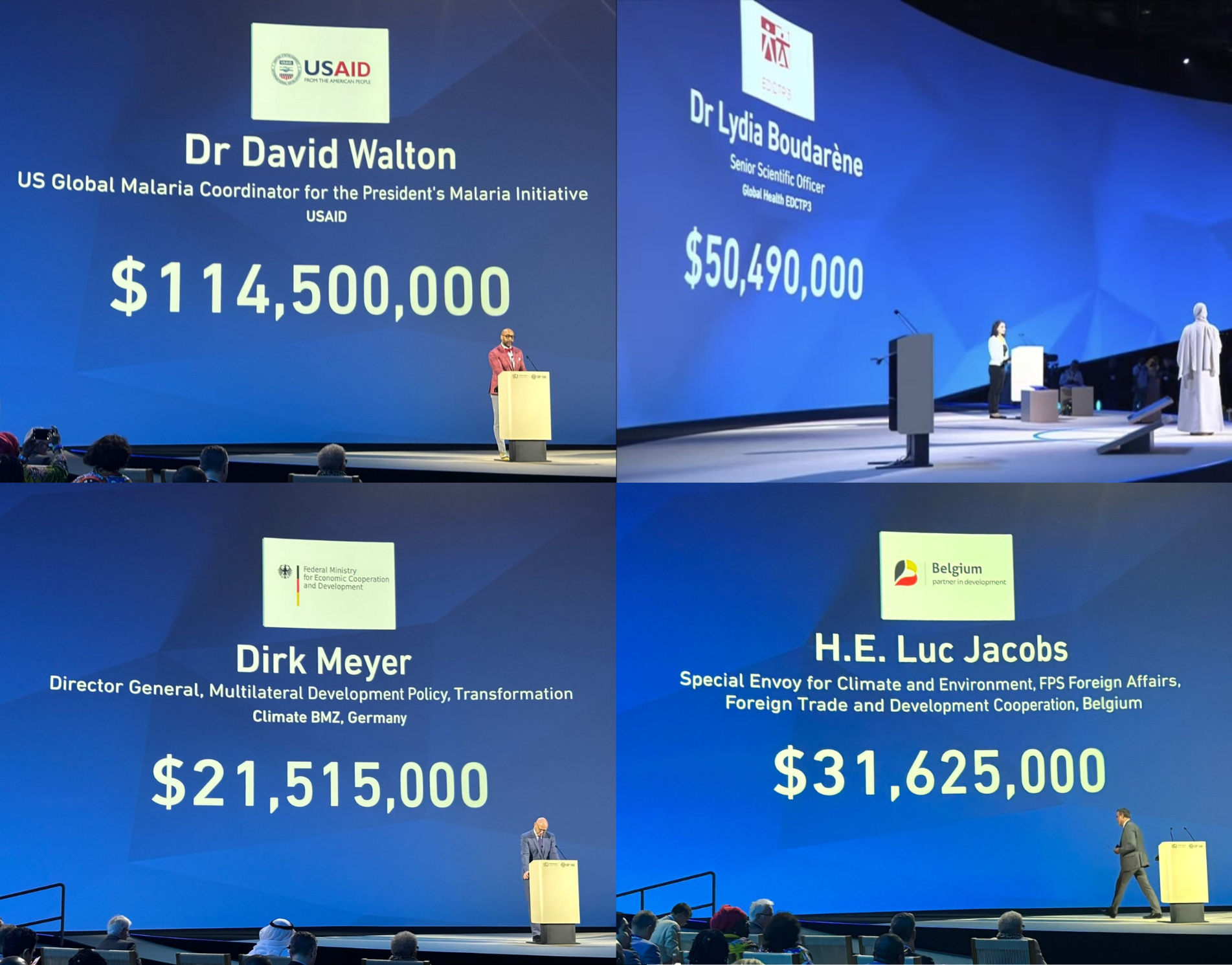
Collectively, this resulted in US $777.2 million of vital funding towards tackling NTDs which will help finance essential programs and treatments, support new research and innovations, and strengthen frontline health systems and workforces, among other investments. We were delighted to see such incredible amounts of funding announced from global partners, going a long way to supporting the 1.6 billion people affected by NTDs and helping us to goals in WHO’s NTD road map.
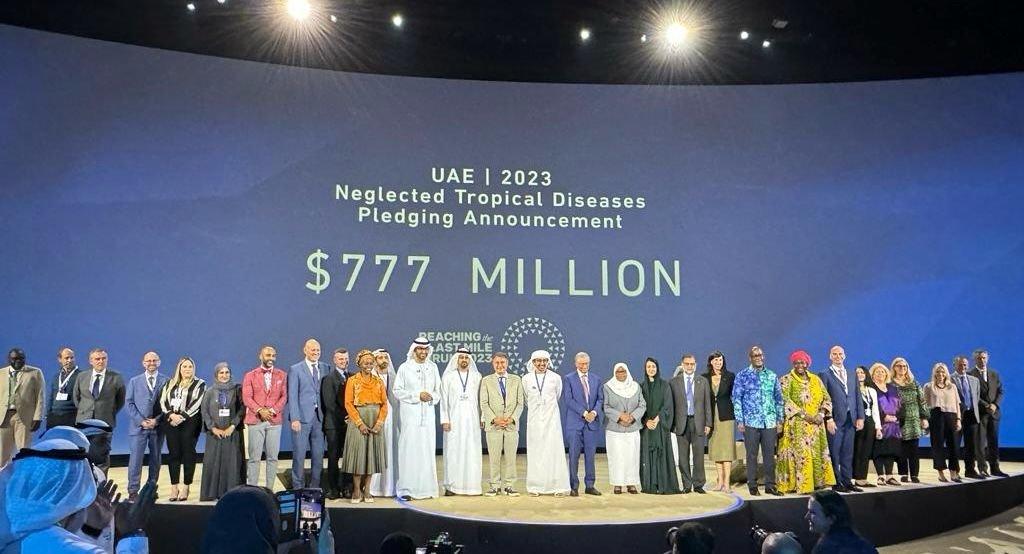
Following such an outstanding collaboration of pledges came the ‘Recognizing Excellence Around Champions of Health’ (REACH) Awards to celebrate those who have demonstrated extraordinary leadership and commitment in the fields of disease elimination, and we congratulate all the amazing winners and nominees.
To close, what could be more fitting than a young change-maker standing on stage to deliver an inspiring talk, calling on the world to act? 13-year-old Ellyanne Wanjiku Chlystun Githae is a young climate activist, passionate about sharing the health impacts of climate change.
Following the Forum, our Executive Director Thoko Elphick-Pooley appeared on SABC News to promote its success and recognise commitments made, saying:
"I want to celebrate new players coming in to beat NTDs and committing at the Reaching the Last Mile Forum at COP28, including from African philanthropists and African governments."
We’d like to thank Reaching the Last Mile and the Bill & Melinda Gates Foundation for a fantastic event, and a huge thank you to all the partners who made commitments and stood #100PercentCommitted to #BeatNTDs.
